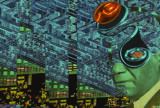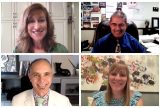Retired California Chief Justice Tani Cantil-Sakauye
You Make Your Joy
Tani Cantil-Sakauye was the 28th Chief Justice of the State of California. The first Asian Filipina American and the second woman to serve as the state’s chief justice, she is the current president and CEO of the Public Policy Institute of California. Before sitting on the panel for “What Makes a Great California Idea?,” part of the inaugural CalMatters Ideas Festival, Cantil-Sakauye joined us in the green room to talk about humor, mediation, and the “Sackamenna Kid.”










